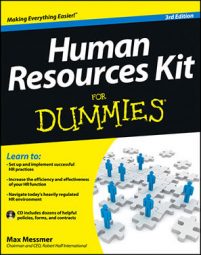Pre-employment testing is probably the most controversial of all evaluation options in use today. Everybody agrees with the basic rationale that test results often can alert you to attributes and potential problems that you can’t infer from a résumé and that don’t necessarily surface during an interview. No one, however, has proved in a scientifically conclusive way that testing leads to foolproof or even better hires.
If you use them correctly and in the right situations, however, many tests can help you evaluate job candidates. Correctly and fairly administered, tests objectively measure basic skills, assess acquired knowledge and qualifications, and gauge aptitude for certain jobs.
The quality and sophistication of tests have improved markedly in recent years, and many organizations, including some of the largest in the nation, are returning to certain types of testing as a valuable predictive tool.
Businesses often conduct some types of evaluative tests prior to selecting candidates for an interview. Some companies also administer more comprehensive, extensive, and costly tests and checks after the candidate’s first or second interview, when managers are closer to making a final decision (background checks, for example). Still other employers test professionals after making a conditional offer of employment.
Pre-employment testing raises myriad legal issues that can be extremely complicated to work through. If you do test candidates, keep in mind that individuals can’t be singled out to be tested. Tests must be applied consistently to all candidates for a position or, in some cases, for all positions within a particular department or business unit.
In general, employee hiring or selection tests must have a direct relationship to the employment in question. If a hiring test results in an adverse impact on a protected group, it’s the employer’s burden to show that the test is job related and consistent with business needs. One way to make this clear is to show that the testing procedures have been validated by scientifically acceptable methodology.
The Uniform Guidelines on Employee Selection Procedures, adopted by a collaboration of federal agencies (including the Equal Employment Opportunity Commission [EEOC] and Department of Labor) and set forth in federal regulations, apply (by their own terms) to employee-selection devices. The guidelines set forth detailed criteria for validating selection devices and seek to ensure that testing results in decisions based upon meaningful differences in qualifications.
The safest course is to consult with an attorney before implementing a hiring test of any kind. The EEOC has published a helpful fact sheet, entitled "Employment Tests and Selection Procedures".
The following tips may keep you out of hot water:
Before adopting or implementing any employee selection testing, get legal advice. As mentioned earlier, pre-employment testing implicates numerous federal and state law regulations.
Establish what traits or information the test is designed to evaluate and make sure that a relationship exists between these traits and the hiring criteria.
Carefully check the credentials and reputation of any test vendor. Ask to see validation data.
If you use a test, double-check that the test isn’t biased either in its objective criteria or unintentionally by disproportionately impacting a protected group.
Verify that the test is certified by an established, reputable group, and validated in accordance with the Uniform Guidelines on Employee Selection Procedures from the EEOC.
Network. Talk to colleagues, associates, and people in other companies who use testing. Ask if their testing has been successful.
Local colleges or other organizations sometimes offer skills assessment assistance or programs. Check them out.
Remember that your company is ultimately responsible for any testing that you conduct. EEOC guidelines treat online testing in the same manner as paper-and-pencil tests. Given that this is legally a very complex area, consult with an attorney before implementing a hiring test of any kind.
Also, be sure to carefully manage the data you collect through these tests. Limit the number of people with access to this information to the fewest possible in order to protect the confidentiality of the candidates you test.

